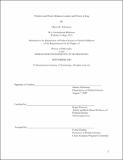Prophets and priests : religious leaders and protest in Iraq
Author(s)
Alshamary, Marsin R.(Marsin Rahim)
Download1249943171-MIT.pdf (3.786Mb)
Other Contributors
Massachusetts Institute of Technology. Department of Political Science.
Advisor
Roger Petersen.
Terms of use
Metadata
Show full item recordAbstract
When do religious clerics join anti-government protest and in what capacity? In my dissertation project, I argue that clerical participation in protest is mediated by the internal structure of the religious system. Specifically, the degree of hierarchy and bureaucratization of a religious system imposes different abilities and responsibilities on individual clerics therein. In turn, these factors mediate clerical behavior and determine the type and timing of clerical participation in the face of external pressures and particular ideological leanings. I build this structural theory of clerical participation by analyzing the behavior of clerics in the Iraqi Hawza (the Shiʻa religious establishment) in six instances of anti-government protest from 1917 to 2020. I triangulate data gathered from clerical, government, and opposition resources from ten months of fieldwork in Iraq in addition to archival work and interviews in the United States and the United Kingdom. I argue that clerical decisions to participate in protest are influenced by structural pressures from their respective position in their religious institutions. When religious elites feel a responsibility to maintain the institutional integrity of the religious establishment, they avoid advocating rebellion because it risks harming the institution. Rebellion is most likely to be instigated and supported by religious elites who are influential but who feel limited institutional responsibilities. These influential, low-responsibility clerics are few in number because influence and responsibility tend to go together, but their call to action can plunge a society into violence. In the Iraqi case, these tend to be clerics with informal (usually, familial) ties to the religious establishment but no official position within it. High-responsibility clerics may get involved in protest after violence has broken out, seeking to manage the conflict in ways that will leave the institutions unscathed. These arguments hold across over a century of Iraqi history and have significant policy implications for the region.
Description
Thesis: Ph. D., Massachusetts Institute of Technology, Department of Political Science, September, 2020 Cataloged from the official PDF version of thesis. "September 2020." Includes bibliographical references (pages 264-278).
Date issued
2020Department
Massachusetts Institute of Technology. Department of Political SciencePublisher
Massachusetts Institute of Technology
Keywords
Political Science.